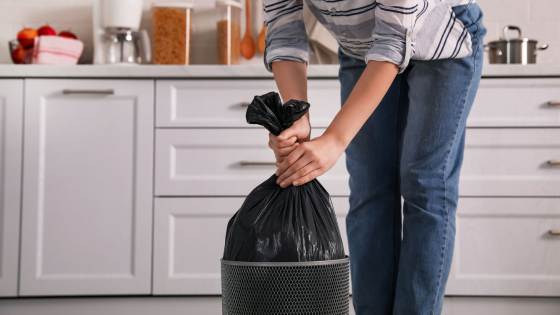“Trash” is generally considered an all-encompassing term for anything we don’t want to keep. In reality, there are a number of common household and home improvement items that should never find their way into a garbage can for health and safety reasons. Some are actually illegal to dump, which means you could incur serious penalties.
The Environmental Protection Agency (EPA) maintains a list of products and substances that pose a hazard to the health of humans and nature if not disposed of properly. Think twice before tossing any of these eight items into a dumpster.
- Electronics
The race to keep up with the latest and greatest tech devices leaves many old models by the wayside. Lead, cadmium, and other metals used in electronics can release toxic materials into the environment. Most communities have electronics recycling centers, so devices and their parts may be reused. - Household Batteries
Not only are batteries full of toxic metals and chemicals, but they are actually combustible under the right circumstances. Rechargeable, button, and uninterruptible power supply (UPS) batteries should always be taken to a household hazardous waste (HHW) facility. Alkaline batteries are now classified as safe for common waste, but it can’t hurt to take them to an HHW facility along with the others. - Paint
Once you’re done with that home improvement project, don’t pour leftover paint down the drain. Leave the can open until the paint dries and take it to a scrap metal recycling center, or take it directly to an HHW facility. - Light Bulbs
Old-school incandescent light bulbs are considered common waste, although they should be wrapped in cardboard or paper before disposal. On the other hand, fluorescent light bulbs contain mercury and should go to an HHW facility for recycling. - Thermometers and Thermostats
The digital revolution has reached thermometers and thermostats, but older models contain mercury. If your home improvement to-do list includes updating the thermostat, find a proper recycling center online or consult your contractor about disposal. - Lawn and Garden Chemicals
When used correctly by carefully following instructions, lawn and garden chemicals have a purpose. But if they’re spread indiscriminately via the water supply or landfills, these products can cause serious damage to the ecosystem. Dispose of them at an HHW facility or recycle them by sharing leftover products with neighbors. - Pharmaceuticals
In the past, it was taken for granted that flushing unused or expired medications down the toilet was the safest disposal method. That was shown to be false when investigations discovered the presence of drugs in the drinking water of several large metropolitan areas. As a result, many communities have created pharmaceutical take-back sites or events. If there are no programs in your area, check with your pharmacist or local police department about safe disposal options. - Motor Oil and Transmission Fluid
If you’re a weekend mechanic, cap off your DIY maintenance sessions with a trip to the nearest auto repair shop or HHW facility to dispose of the old motor oil or transmission fluid.
Home improvement doesn’t have to mean environmental destruction. Make it a habit to learn and follow safe trash disposal methods.


 Facebook
Facebook
 X
X
 Pinterest
Pinterest
 Copy Link
Copy Link


